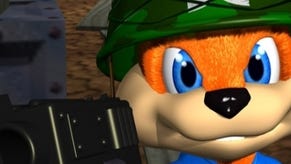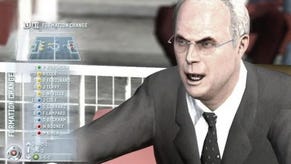Perfect Dark Zero
Not Perfect, quite dark, and no, not a zero out of ten.
Zen of gaming, indeed.
If Microsoft was hoping that Perfect Dark Zero was going to be one of the pillar launch titles to usher in the next generation in a blaze of glory, then it must be - deep down - pretty disappointed. Let's not beat around the bush. Microsoft wanted, needed, another Halo-sized launch title, but Perfect Dark Zero most definitely isn’t it.
The plain, unpalatable, inescapable truth is that Rare's latest shooter is worryingly far away from being a classic. Through gritted teeth you could admit that it's "a respectable, solid, mostly entertaining secret agent FPS". Being diplomatic you might well concede that it’s "a good genre offering" that "devoted FPS fans will enjoy", but that sounds so glib. In the context of a high-profile next generation blockbuster, such down-played compliments sound like insults.
It needed to be a GoldenEye-beater, a Halo-killer, a game to send Valve and id back to the drawing board. The annoying thing is, the only thing it's likely to kill is Rare's already waning reputation for triple A' perfection. It's a solid follow-up to a five year-old N64 title with some decent multiplayer elements. And that's all it'll ever be.
Dark relief
Much like Rare's other two celebrated spy FPSs, PDZ continues down the same path and even gets the Bond tributes out of the way before you've so much as reached the menu screen. As expected, you're treated to all the gadgets, stealth-lite and back-to-base communication that goes with being the queen of espionage. In addition to a standard loadout of all the familiar weapons (of which you can generally only carry two at a time, though a third slot offers dual-wield for a select few, as well as occasional grenades) you also get a few standard context-sensitive gadgets: the Locktopus (bet you can't guess what this does), the hacking Data Thief, the destructive Demo Kit, not to mention some one-off high tech items like the remote-controlled CamSpy and the sound-enhancing Audioscope. Rare resists the temptation to overload the spy element too much, though. First person Splinter Cell this is not.
Predictably, such high tech espionage comes at a price; your detection is ruthlessly punished by well-armed and heavily armoured enemy patrols just itching to put bullets into your perfectly coiffeured skull. As such, it's clear right from the word go that PDZ doesn't really adhere to the run and gun premise most other titles in this over-crowded genre are happy to peddle - unless you completely cop-out and play it on the ridiculously forgiving Agent difficulty level, that is.
The surprising thing that hits you almost immediately about PDZ is its steep learning curve and unrelenting desire to finish you off as quickly as possible. Throughout the entire game Joanna Dark is consistently poking her nose in places it's not wanted, and needless to say, exposing a corporate web of conspiracy puts you in the firing line of all manner of patrolling sentries. Just one misplaced head-shot is often enough to provoke a cavalry charge that exposes your frailty with ruthless efficiency.
Charge of the dark brigade
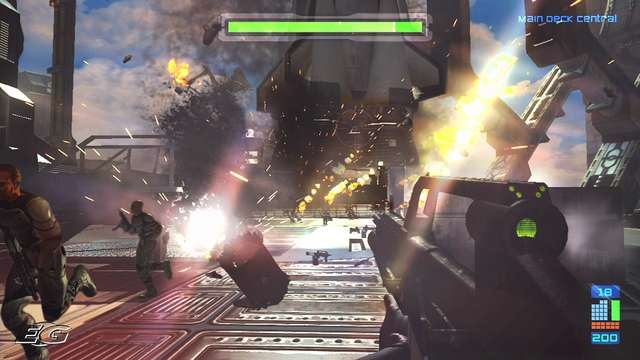
With little choice but to either restart or face them head on (and no opportunity to run or hide until they go back to their patrols) you'll regularly find yourself fending off a dozen enemies at once. If that wasn't a daunting enough prospect, Joanna's armed with guns that, for the majority of the game, can't take them down with a single clip. With such a resolute enemy barrage to contend with, the principle challenge you'll face is trying to kill them without copping too many bullets in return. Sometimes a clean headshot is enough, but other times their helmet protection cancels out that little advantage. With Kevlar vests and helmets to shatter first, it's often several rounds before you've seen off a single enemy - and dealing with that while also keeping a close eye on your health situation is a big ask when there's more than two or three AIs taking pot-shots at your head.
One of the main aspects to put the player at a disadvantage is that unlike the standard health pack/health station system almost all FPSs favour, Joanna is fitted with a recharge system that refills your bar if you can avoid damage for a few seconds. Although it's Halo-esque, the overall maximum hit points permanently degrade, leaving you progressively disadvantaged. With the twin menace of health concerns (less so on the easy mode) and a sluggish reload system to contend with (there's no automatic reload, annoyingly), the combat's a real challenge. Much more so than your average FPS.
This would be okay if the encounters felt as fun as the best FPSs out there. We don't mind a challenge, but when the game lacks basic AI sophistication and aggravates the player with questionable gameplay ethics, the marks are chipped away. Enemies seem to be either on pre-programmed patrols or charging mob-handed directly at you, with precious little evidence of working as a team to, for example, out-flank you. With the odds so heavily against you, they don't really need to be all that clever - they just charge, zig-zag around like the most irritating online bots and generally don't look remotely convincing. Eventually, you discover that the best tactic is to either retreat and funnel them Pied Piper-style down corridors and take them down up-close one by one, or find some distant cover and continually pop out when appropriate. Halo won people over via excellent AI which provided that trademark "thirty seconds of fun over and over," but here it's an entirely different experience that's a little at odds with what you might want or expect from a console shooter.
Dark-headed
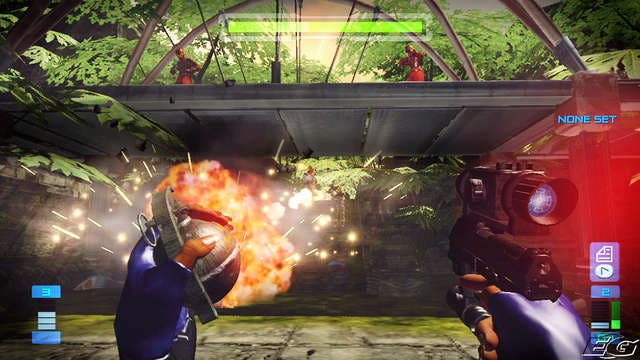
To compound matters, you're also robbed of the ability to save your progress (and only a single mid-level checkpoint offering any respite) meaning you're forced to encounter a long-forgotten degree of trial and error to make progress. And, yet, after all this, the game is constantly hand-holding the player by laying down path chevrons to guide you directly to where you should be heading next. What it gives with one hand it punches you in the face with the other. We really don't get that at all. It's as if Microsoft pointed out the game was a little on the tricky side and this was the only compromise Rare could come up with. Daft.
But, despite the core combat, health and saving mechanics being at odds with most of the FPS competition, and the silly path pointers being a giant insult to your intelligence, the more you play it, the more these design decisions begin to justify themselves. What you don’t realise in the initial stages is that none of PDZ's levels are all that big, or take that long to finish, so it's reasonable for Rare to assume that quicksave shenanigans and less tough combat would make the whole thing a cakewalk and rob the whole game of the tension of sleuthy battle. About halfway through it all starts to feel strangely enjoyable. Far from cursing Rare's existence, it feels different and actually quite engaging. Even with the path pointers.
Indeed, once you fail five, ten, fifteen times and gradually chip your way towards level completion, you'll often surprise yourself at the extent of your struggle. With hindsight, once you know what you're doing and where things are, it's never as tough as you thought. Hell, once you've got the whole thing nailed, you can generally go back and rip through most levels again in ten minutes, give or take. No wonder Rare didn't offer quicksave facilities. No wonder it takes a few rounds to see off enemies. No wonder it's best to work out a stealthier approach.
Darker fuel
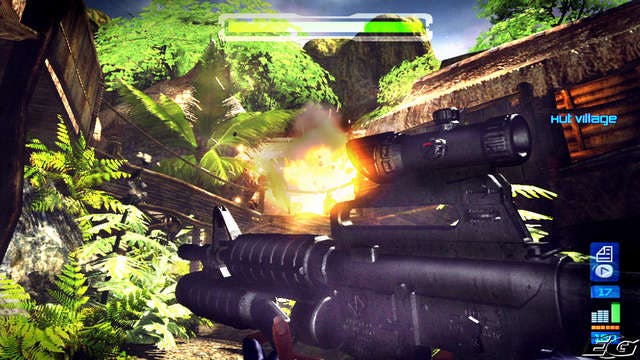
Nevertheless, as an experienced FPS-player schooled in the norms of the genre, you're not to know that. For the first few hours you'll probably curse the game for taking such glee in sending you back to the start of a mission you've been sweating over for ages. It's an old-school approach where precise stats are measured on an online Leaderboard for you to compare against the best players in the world. But like most old-school approaches, they're great for the embattled hardcore, but annoying as hell for the masses Microsoft wants to reach. If the Redmond giant really wants to reach a billion players, then it had better start making games that everyone will enjoy. As admirable as it is to see Rare following some of the design principles laid down in GoldenEye and Perfect Dark in producing a game as challenging as this, it's one that seems out of place in today's market. One that's inexplicably targeted at those of a dogged, persistent nature: those that don't mind replaying the same level from scratch dozens of times until they finally crack it.
While persistence really does reap its own rewards (and the excellent online Leaderboards that detail every possible performance stat and endless Gamerscore achievements provide an excellent incentive to go back and show off just how good you are), and Perfect Dark Zero slowly emerges as an entertaining game on its own merits, there's still the nagging feeling that it's not a game worthy of the 360. The visuals are the real giveaway, delivering a degree of fidelity that wouldn't look out of place on the original Xbox. Sure, played in high def it's reasonably impressive, but leagues away from getting near some of the best looking PC titles of the past 12 months. The real killer is the distinctly rubbery, glossy feel about everything. If you're not cringing at the latex enemies and their bizarre ragdoll death animations then you'll baulk at the artificial shininess of the world around you. Rocks should be gritty and harsh, not slick and shiny. Waterfalls shouldn't look like molten acrylic. Artistically, it's just not at the races.
But it goes further than some unwise texture designs and waxwork enemies. The level designs are carved out of standard issue Xbox stone, and everything from their size, scale and ambition just reeks of conventional thinking. Cranking up the resolution and cloaking the whole thing in a glossy ooze doesn't make it next gen by any stretch of the imagination. Even Microsoft's Peter Moore admitted as much recently.
Live a little
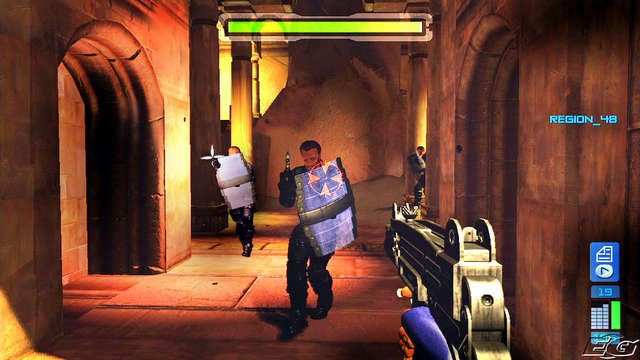
As you might expect, the multiplayer elements help a little - especially online (though System Link and split-screen is available offline) - but certainly nowhere near enough. Perhaps the best part of the package is the ability to engage in bona-fide co-operative multiplayer over Live. For once, that doesn’t simply mean playing side by side and doubling up the firepower. For once, some of the levels have been designed with co-op in mind. For example, the much-demoed third level has Joanna providing cover fire for her father Jack as he hops from one point of the level to the next. In the single player campaign Jack's AI controlled, but co-op lets you take direct control of his actions, making the experience a much more engaging affair all-round.
The only problem with this is that the reason it's so much more engaging is probably more down to the fact that the computer-controlled Jack can be such a complete doofus, forever getting himself killed even when you're busy firing off head-shots left and right. It's almost more engaging to play in co-op by default - although it's fair to say that relying on a pal to be any better at the game is a leap of faith all of its own. Even so, it's nice to see some thought being devoted to collaborative multiplayer than merely trawling out deathmatch mode for the 217th time of asking.
That's not to say that Rare resisted the temptation to play to the crowd, though. It hardly warrants a mention that all the favourite modes are here, from standard deathmatch (killcount), a team version, Capture the Flag and the node gathering domination mode Territorial Gains. Of the four, Territorial gains worked best by actually lending some degree of purpose and variety to the unending slaughter. Rare definitely also gets a big thumbs up for including the hugely entertaining Hovercrafts and Jetpacks to climb into and roar around in. Small additions for sure, but ones that help make up for the overall snail's pace of Joanna's running speed and inject a lot of fun into the proceedings.
Give me hope, Joanna
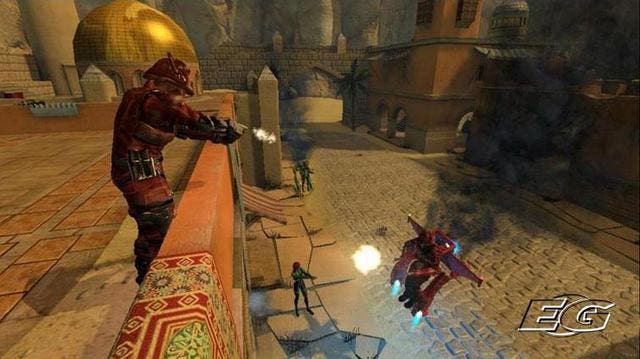
On the flip-side there's the Dark Ops multiplayer, which adds a little more flavour thanks to its more tactical, slower-paced approach. Played over a series of rounds, you first get to buy your weapons - Counter-Strike-style - and then earn cash subsequently for kills and accomplishing objectives.
In terms of modes, Eradication is a straight-up last man standing team-based affair, Onslaught is an interesting 'best time wins' defend/attack the base team game, but only gives the defending team one life, against an infinitely respawning opposition. Infection, meanwhile pits the infected against the uninfected, with players scoring points if they either remain uninfected or manage to wipe out the uninfected. Slightly confusing premise, but a lot of fun. Finally, the hilarious team-only Sabotage involves trying to cause as much damage to your opponent's property as possible. Hurrah, endorsed vandalism! Jack Thompson, here's your next case!
We're 2000 words on: what's here? Despite so evidently wanting to provide us with a game in the spirit of its previous shooters, Perfect Dark Zero lacks either the atmosphere or the design brilliance of Rare's previous examples to step out of their shadows. In many senses, it spends too much time gazing fondly back at the past rather than embracing an exciting future. As a result, the single player campaign trips over its own shoelaces in forgetting that keeping the player constantly entertained should always be any game's raison d'être. Too much of the time Rare's needlessly bashing the player over the head and forcing you into a level of trial and error that requires an extensive investment of time from the player before they can really start to have the fun they paid their money for. Any game that demands the player work hard for their fun is asking for trouble in this day and age - and frankly we're baffled by an approach that's completely contradictory to all the messages Microsoft has been sending out over the past six months.
Alone again, or...
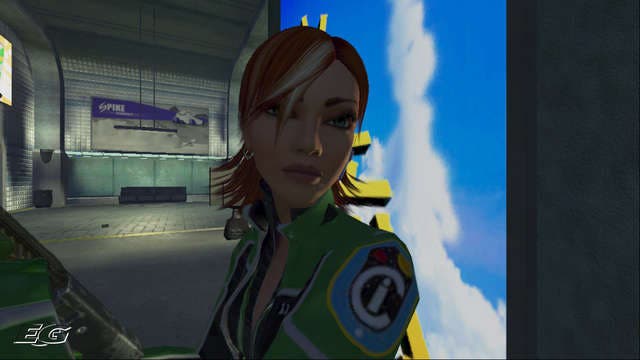
The fact that the multiplayer angle manages to rescue the package somewhat does save the project from the dire fate you've probably been predicting. Admittedly, the game's best enjoyed this way, but whether the majority of the audience will be rushing to join the Live bandwagon is unknown at this point. Certainly, we Europeans seem a little resistant to doing so, in which case many of you will miss out on the game's real saving grace.
But even with some solid multiplayer gaming on offer, it still only just warrants a seven. When you've battled through all 14 single player levels, played it on co-op and worked your way through some solid multiplayer action, you won’t feel like you've played a next generation title; heck, you won't even feel like you've played the best shooter out this Christmas. It's too evident that it's a decent title designed for the Xbox and belatedly buffed up to an HD shine, and that’s really no way to go about producing a next-gen launch title. Entirely on its own merits, Perfect Dark Zero is not a bad game by any means, but in the context of being as an introduction to the next generation Perfect Dark Zero misses the mark by a disappointing margin. To release a game lacking real spark and inspiration at this stage is not good news for anyone, least of all Rare and Microsoft. Both need to think long and hard about where they go from here.



